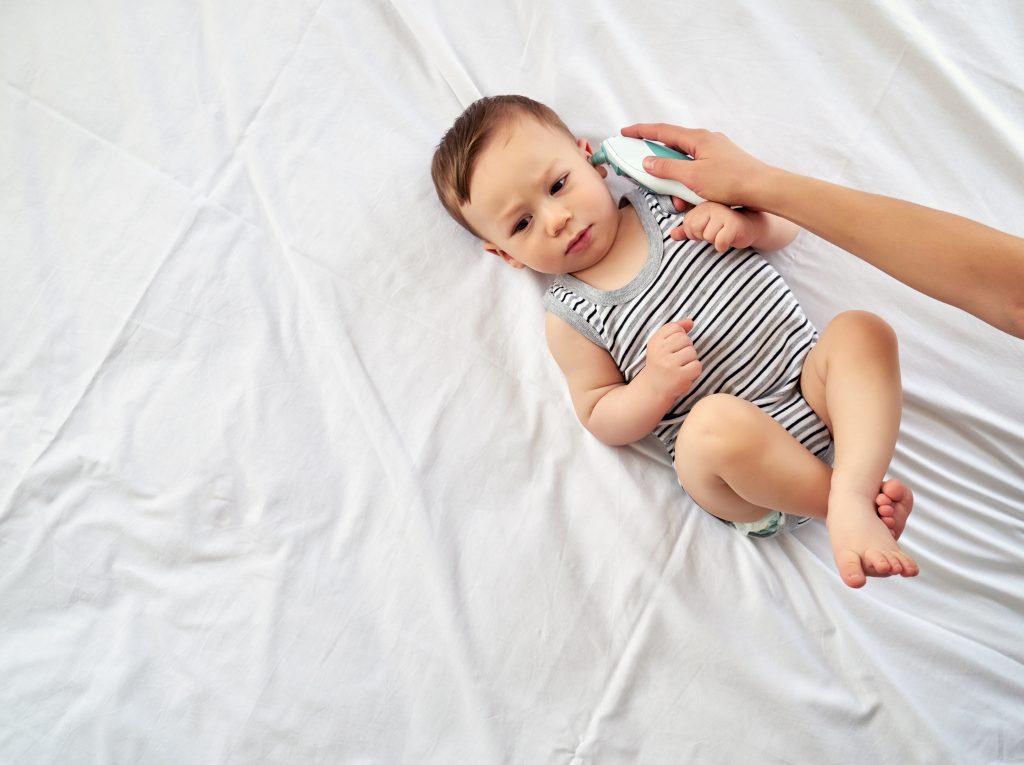Baby’s First Fever: Everything You Need to Know

You’ve done it! You survived the first 4 months with your brand new baby! Sure, you may be exhausted, a bit rundown, and maybe it’s been a few days since you’ve taken a proper shower, but you’re all alive. It’s really quite an accomplishment. You feel like you’ve got this whole “parenting” thing down.
And then out of nowhere, something changes. Your baby starts to act a bit differently, maybe they are sleeping more or less than normal, or they are fussier than you are used to. All of a sudden, they are refusing to take the bottle or the breast and you notice that your baby’s cheeks are flushed and they feel a bit warmer than normal.
These are all signs that your baby may be battling a fever. It was likely going to happen sooner or later. The best thing you can do for your baby is to know how to identify and how to treat your baby when they are running a fever. Baby’s First Fever: Everything You Need to Know
What is considered a fever in a baby?
The first thing you need to know as a parent is what qualifies as a fever for a baby. If your baby’s temperature is above 100.4° Fahrenheit, they have a fever.
What are the symptoms of a fever in a baby?
Usually the symptoms of a fever are very obvious to new moms and dads.
- Your baby is warm and flushed.
- Your baby’s behaviour has changed.
- Your baby’s sleep patterns have changed.
- Your baby’s feeding habits have changed.
If your baby is experiencing any of these symptoms and you are worried that they may be running a fever, it’s time to take action. The first thing you should do is take your baby’s temperature to confirm your suspicions.
Taking a baby’s temperature
There are a million and one different thermometers on the market nowadays. You’re probably most familiar with the small glass thermometers that your mother used to put under your tongue as a kid. There are also forehead, ear and under-the-arm thermometers that might seem like the best bet when you are shopping around.
But according to pediatricians, when you are dealing with a child who is 3 months or younger, the best bet is to use a digital thermometer to take a rectal or an armpit temperature. Don’t turn to your digital ear or forehead thermometer until your child is at least 4 months old. And if a thermometer gives you a result that you aren’t quite sure is correct, take a rectal temperature—they are considered the most accurate readings.
When our little ones are sick, we want to do everything in our power make them feel better. Thankfully there are some things you can do to help ease your baby’s fever from home.
Keep your baby hydrated: Just like an adult, keeping your baby hydrated when they are running a fever is very important. Even though your baby’s feeding habits may have changed, try to keep them hydrated with breast milk or formula. If you are worried that your baby isn’t getting enough liquids, consult your doctor.
Give your baby a fever reducer: If your baby is over 4 months old, ask your doctor if you can give them a fever reducer like Advil Pediatric Drops. Advil Pediatric Drops are clinically proven to provide your baby with up to 8 hours of fever relief and are recommended by doctors across Canada. If your baby is under four months old, you will need to consult your doctor before giving your baby any kind of fever medication.
Give your baby a sponge bath: One of the oldest and most effective home remedies for a baby fever is a sponge bath. You want to avoid giving your baby a full bath, where they will be fully covered in water. Instead, use a washcloth to dab lukewarm water on their forehead, neck, arms, and stomach.
When to call a doctor
While heading over to your pediatrician might be your go-to move when your little one is sick, there are some age guidelines you can follow to help you make the decision on when to take your baby to the doctor.
If your baby is under 3 months and has a rectal temperature of 100.4° Fahrenheit or higher, they should be checked out by a medical professional right away.
Once your baby is 3 to 6 months old, you only need to take them to the doctor if their fever is 102° Fahrenheit or higher (when taken rectally). Babies at this age are better able to fight off a fever. And once they are 4 months or older, you can help them combat their fever with Advil Pediatric Drops. If your baby’s temperature lasts more than 3 days, or they aren’t able to take any fluids, you should call your pediatrician.
At 6+ months, your child may be teething, have an ear infection or a respiratory tract infection. At this age, you can administer Advil Pediatric Drops to help make them more comfortable. Once again, if their rectal temperature is higher than 102° Fahrenheit and lasts for longer than one day, if they have changes in their behaviour that don’t subside, or if they are pulling on their ears, it’s time to make an appointment with your pediatrician.
You should immediately call your child’s doctor if your child:
- Is listless or irritable, vomits repeatedly, has a severe headache or stomach ache, or has any other symptoms causing significant discomfort.
- Has a fever after being in a hot car.
- Has a fever that lasts longer than three days.
- Appears listless and has poor eye contact with you.
Remember, if you are ever in doubt or unsure about how you should treat your baby’s symptoms, consult a doctor or pediatrician.
This information is provided for informational purposes only and is not intended as a substitute of any kind for professional medical advice, diagnosis or treatment of a qualified professional as required. Speak to your healthcare professional before making any changes to your lifestyle, or beginning or discontinuing any course of treatment. Never disregard professional medical advice or delay in seeking it because of something you have read on this site
















